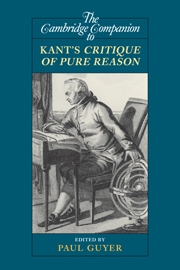1 - Kant’s Copernican Turn and the Rationalist Tradition
from Part I - The Background to the Critique
Published online by Cambridge University Press: 28 July 2010
Summary
The Critique of Pure Reason sets out to establish the sources, extent, and limits of a priori knowledge, with a view to ascertaining the prospects for metaphysics as a scientific enterprise. Kant defines a priori knowledge as knowledge that is “absolutely independent of all experience,” and distinguishes it from empirical knowledge, whose sources lie in experience (B 2-3). The Critique's second edition frames its overarching goal as a general solution to the problem: How are synthetic judgments a priori possible? (B 19) This formulation, intended to express the work's focus on the problem of non-trivial a priori knowledge of objects, presupposes two important doctrines. Kant holds that the knowledge constituting the proper end of metaphysics is never mere empirical knowledge, even when the object of investigation is empirical reality. He also insists that substantive knowledge of objects does not find expression in merely analytic judgments - those in which the predicate “does not add anything” to the subject concept, but merely “breaks up” this subject concept into components “already thought in it” (A 6-7/B 10-11). The Critique's epistemological investigation aims to “assure to reason its lawful claims, and dismiss all groundless pretensions, not by despotic decrees, but in accordance with reason's own eternal and unalterable laws” (A xi-xii). Kant employs “reason” in such contexts, in contrast to a narrower sense later introduced, as a general label for cognitive capacities underwriting a priori knowledge (A 11/B 24; A 305/B 363; A 323/B 380).
- Type
- Chapter
- Information
- Publisher: Cambridge University PressPrint publication year: 2010
- 7
- Cited by



